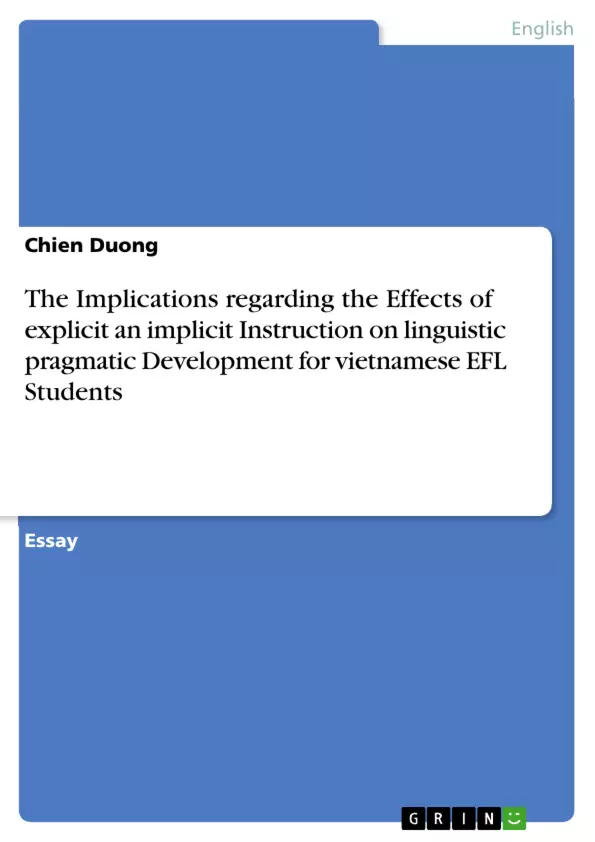In recent years, a considerable scholarly literature has accumulated regarding the most effective techniques for EFL students to develop what is termed, 'pragmatic linguistic competency'. Because the concept of ‘pragmatic linguistic competency’ represents a notion that is somewhat obscurely defined as ‘the capacity to use English language appropriately in spontaneous speaking contexts', the latitude for ambivalent interpretation is more common than we believe it should be. Part of our purpose in this paper is to relieve at least some of the resultant ambiguity surrounding this definition by reconceptualising it in the context of the current pedagogic debate which differentiates two EFL approaches to pragmatic linguistic competency. Both heuristic approaches have come to feature prominently within this framework.
These techniques or approaches have become known as ‘explicit’ and ‘implicit’ instructional pedagogies. We argue that the explicit pragmatic language acquisition process signifies learning environments in which the learner is introduced to a range of explicitly relevant rules. These rules are reckoned to be interpretively foundational to the form of linguistic constructions required, in the sense that these rules function as a coherent combinatory set. On the other hand, the heuristic of implicit pedagogy “makes no overt reference to rules or forms” (Doughty, 2007, p.265), but only to forms of speech that depend upon rule-governed pragmatics, whose logical structures are to be discovered as students manipulate them, more or less skillfully, during their actual participatory contributions to the conversational exchange. Our objective in this paper will be concerned to diminish the ambivalence which characterises the interpretation of pragmatic linguistic competency by providing a more comprehensive and coherent conceptual scheme for its linguistic deployment.
Inhaltsverzeichnis (Table of Contents)
- Abstract
- Introduction
- Pragmatic Competence
- Pragmatic Failure in Vietnam Context
- Explicit and Implicit Instruction
Zielsetzung und Themenschwerpunkte (Objectives and Key Themes)
This paper aims to clarify the concept of "pragmatic linguistic competency" and critically evaluate the debate surrounding explicit and implicit instruction in teaching pragmatic language acquisition to Vietnamese EFL students. It aims to demonstrate that the debate is limited in scope and does not fully represent the effectiveness of each approach.
- Defining "pragmatic linguistic competency" in the context of EFL teaching
- Examining the debate surrounding explicit and implicit instruction
- Exploring the impact of pragmatic failure on Vietnamese EFL learners
- Assessing the effectiveness of explicit and implicit instruction in teaching pragmatics
- Highlighting the importance of incorporating pragmatic instruction into EFL classrooms
Zusammenfassung der Kapitel (Chapter Summaries)
- Abstract: Introduces the paper's objectives and key themes, emphasizing the need for a comprehensive understanding of "pragmatic linguistic competency" and the differences between explicit and implicit instruction.
- Introduction: Defines pragmatics and its significance in effective communication, highlighting the challenges faced by EFL learners in achieving pragmatic competence. Discusses the existing research on the effectiveness of instructional interventions in EFL and ESL classrooms to foster pragmatic competence.
- Pragmatic Competence: Defines pragmatic competence and explores its importance in foreign language development and instruction. Emphasizes the need for explicit instruction in pragmatic aspects of language use in EFL environments, particularly for Vietnamese learners.
- Pragmatic Failure in Vietnam Context: Examines the phenomenon of pragmatic transfer and its impact on Vietnamese EFL learners. Discusses the challenges faced by Vietnamese students in understanding and producing appropriate English speech acts and the potential consequences of pragmatic failure.
- Explicit and Implicit Instruction: Explores the debate surrounding explicit and implicit instruction in teaching pragmatics. Presents a detailed overview of the differences between the two approaches and their potential effectiveness in enhancing pragmatic competence among EFL learners.
Schlüsselwörter (Keywords)
This paper focuses on pragmatics, pragmatic competence, pragmatic failure, explicit instruction, implicit instruction, and EFL teaching, specifically in the context of Vietnamese university students. It examines the effectiveness of different instructional approaches for developing pragmatic skills and addresses the challenges faced by Vietnamese EFL learners in achieving pragmatic competence.
- Citation du texte
- Chien Duong (Auteur), 2018, The Implications regarding the Effects of explicit an implicit Instruction on linguistic pragmatic Development for vietnamese EFL Students, Munich, GRIN Verlag, https://www.grin.com/document/426458



